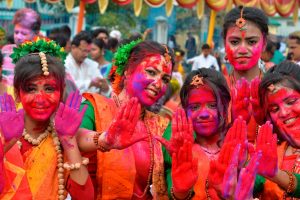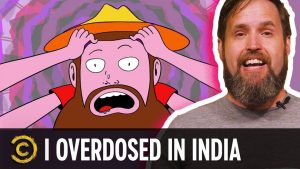Cannabis is illegal in India. Although legal until 1985, India baned ganja with the passage of the Narcotic Drugs and Psychotropic Substances Act. This was an ironic move given the history of weed in India. According to Geographer Barney Warf, “India developed a continuing tradition of psychoactive cannabis cultivation, often with medicinal and religious overtones.” This religious connection actually goes back at least 2,000 years and is associated with the Hindu god Shiva, also referred to as Lord of Bhang, an obvious reference to cannabis.
In fact, The Vedas, a collection of ancient sacred Hindu scriptures, identify cannabis as “. . . one of five sacred plants . . . and a source of happiness, joy-giver, liberator that was compassionately given to humans to help us attain delight and lose fear (Abel, 1980),” according to Jann Gumbiner Ph.D., writing for Psychology Today. And Alakananda Ma, a highly respected spiritual teacher and doctor of Ayurveda explains that marijuana, “In its ancient cultural setting, . . .has for centuries been used by world renouncing sadhus in conjunction with fasts and severe austerities.”
But even though weed is forbidden by national law, like many other places, ganja is prevalent in India. Try as they might, officials have been unable to suppress cannabis from either the consciousness or the bodies of Indians. As The stoner’s guide to weed in India points out, “Whether it’s babas puffing chillums on the roadside, smoky Shiva temples hidden away from the main drag, pungent wild cannabis growing in the mountains, or bhang lassis (legally) sold from grungy holes in the walls, weed is an integral part of India, try as the government does to deny it. It’s no coincidence that the Hindu Kush mountains inspired the name of the popular strain!”

And somehow, bhang lassis remains legal, though it is sold in a secretive hush (nudge, nudge, wink, wink, say no more). Bhang lassis is traditionally prepared using mortar and pestle to grind the buds and leaves of cannabis into a paste, which is then added to milk, ghee, mangoes and Indian spices. Drinking bhang lassis has become almost synonymous with Holi, one of the most revered and celebrated festivals of India. Holifestival.org reports that Holi “is also sometimes called as the ‘festival of love’ as on this day people get to unite together forgetting all resentments and all types of bad feeling towards each other.” Makes perfect sense given that people are high as a Himalayan mountain goat!

But be careful my friend, because bhang lassis is not some watered-down version of an Indian marijuana edible. As the article So you want to try bhang lassis in Varanasi? warns:” I don’t care how many joints you’ve puffed in your glory days—if you’ve never eaten anything containing weed before (or only ever had a mediocre brownie that didn’t actually do anything), be cautious with bhang lassi. Marijuana is significantly more potent when consumed. The high is much heavier, and lasts much longer.”
Beyond the spiritual context associated with bhang lassis, there is actually a sound scientific reason. According to potguide.com, “When you ingest cannabis products, delta-9 THC takes a much longer route through the lower intestines into your liver before entering the bloodstream. Once inside the liver, delta-9 THC molecules get broken down into smaller pieces. This creates the metabolite 11-hydroxy THC.” This has been confirmed in laboratory research, which has “placed hydroxy-11-THC somewhere between 1.5 and 7 times more potent than delta-9 THC.” Additionally, because of the extensive metabolic process associated with digestion, the high can last much longer, for 6-12 hours, depending on the individual and how much he or she has ingested.
And this is where it gets interesting. With such a high potency, 11-hydroxy THC can actually cause some people to experience hallucinations on par with LSD or psilocybin trips. This is precisely what happened to Duncan Trussell when he decided to partake of the bhang lassis concoction. Within an hour, Trussell magically entered the garden of Shiva upon where he received ancient Vedic knowledge and glimpsed the illusion of duality that shackles people to the karmic wheel. Okay, in reality, Trussell tripped balls! And while Trussell is a veteran psychonaut and an experienced marijuana user, nothing could have prepared him for the mind-blowing experience he had. Rather than me describing it second-hand, just check it out here.

So yes, marijuana is legal in India. But perchance you are ever in Varanasi, just be careful about ordering up a round of bhang lassis, at least without a plan for a safe and peaceful experience. And whatever you do, resist the urge for another round because you are too impatient for the first round to kick in. If not, you may feel like you have met Lord Yama prematurely.
At Newsweed.com, we adhere to three simple principles: truth, balance, and relatability. Our articles, podcasts, and videos strive to present content in an accurate, fair, yet compelling and timely manner. We avoid pushing personal or ideological agendas because our only agenda is creating quality content for our audience, whom we are here to serve. That is why our motto is ”Rolling with the times, straining for the truth.”
Your opinion matters. Please share your thoughts in our survey so that Newsweed can better serve you.
Charles Bukowski, the Los Angeles beat poet that captured the depravity of American urban life once said, “There is something about writing poetry that brings a man close to the cliff’s edge.” Newsweed is proud to stand in solidarity and offer you a chance to get close to the cliff’s edge with our first Power of Poetry Contest. Are you a budding bard, a versatile versifier, a rhyming regaler? Do you march to the beat of iambic pentameter, or flow like a river with free verse? If so, here’s your opportunity to put your mad poetic chops to the test. Enter our poetry contest for bragging rights and an opportunity to win some cash!






